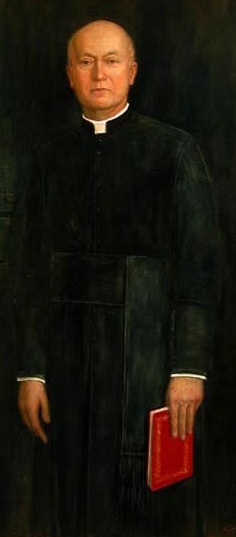
1942: The Start of a Very Long Summer
by Rev. George W. Rutler
As I begin to rummage through the files I have from 1942, I notice a pastoral letter of Msgr. Sigismund Waitz, prince archbishop of Salzburg, read in all his churches on October 19, 1941, but only published in London in July 1942. Archbishop Waitz, along with other prominent Austrian clerics such as the Jesuit Rev. George Bichimair, had been typical of attitudes toward the Jews as "an alien people" who were frustrating attempts at political concordats after World War I. He did not share the amiability that made Theodor Cardinal Innitzer a protector and advocate of Christ's "brothers in Judaism." But even the cardinal was strongly reprimanded by Pope Pius XI and Eugenio Cardinal Pacelli for naively welcoming the Anschluss.
After Cardinal Innitzer's episcopal palace was ransacked by Hitler Youth in 1939, Archbishop Waitz's own residence was attacked by a Nazi mob shouting for him to be sent to Dachau. His letter, read from the pulpits, said:
When I was anointed as a Bishop, the Gospel was placed on my shoulders as God's burden so that I should see that it was preached. We Catholics often have to give way nowadays to outside force. Where earthly matters are concerned we can be patient and silent. Where it concerns our belief, however, there must be no yielding; we must stand firm or die.
Eleven days later, Archbishop Waitz was dead.
In June of 1942, Msgr. Paul Yu Pin, exiled bishop of Nanking and future cardinal, offered Mass for the Allied cause in Chungking, the Chinese provisional capital: "A prayer day is like the stone for David's sling, a simple, foolish, and even scorned way according to many, but which is the most efficacious means of attaining a quick victory and a just and lasting peace."
In France, the Protestant newspaper Feuille in the French unoccupied zone called for Catholic and Protestant unity:
The militant Catholics in our country have taken a place which is important and, we do not fear to say, preponderant, at the head of the movement of resistance in which, very often, they have taken the initiative, and of which they remain the inspiration. . . . The Catholics have not feared to affirm themselves in the sphere of positive action, and, in spite of their repugnance, it is they who most often are the soul of the secret associations of resistance, and who publish anti-collaborationist papers.
The Italian-occupied zone in France was a refuge for Jews fleeing the Vichy government. But ethnic tensions rattled the cobbled armistice between the Italians and the French. Italian newspapers scorned the bishop of Nice, Msgr. Paul Rémond, as an "Italiophobe" for exhorting the Italian boys in his jurisdiction to grow up into "good Frenchman" and for expressing a wish to be called "Sa Grandeur" instead of "Son Excellence," since the latter "is a title given in Italy to rogues and cabmen."
The London Tablet frowned upon the Lord Mayor of Blitz-weary Birmingham for organizing lively summer church services in public parks instead of "mumbled services in cold churches." The editorial comment was equally cold: "The view that worship must have an entertainment value has seldom been so frankly expressed. But American experience has not encouraged those Ministers who have shown a film instead of preaching a sermon. It is the 'reductio ad absurdam' of the foolish and fashionable catering for the modern mind."
A correspondent in Lisbon sends word of the grand Jesuit Rev. C. C. Martindale, a prisoner of war in Denmark for six years: "He sounded much better when he wrote, having had the Last Sacraments about Passion Sunday, and settling down to real angina pectoris . . . . The cold is, I gather, his chief horror . . . . The letter is just like one of his old vivid ones, typed, and of immense length." Father Martindale would go on converting souls with wit and stiff upper lip until his death in 1963.
The newspaper of Poles exiled in London, Widdomosir Polskie, prints a prediction -- nay, prophecy -- of the statesman Count Włodzimierz Dzieduszycki of Lwow written in 1890:
As anything is possible, it may happen that the King of Prussia and the Prussian Junkers will put themselves at the head of a social movement and on its basis establish a new political order. Or, from among the workers there may emerge a dictator who will achieve this after the downfall of the now reigning dynasties. The voice of pessimism will then be hushed for a while and history will witness a final and terrible attempt to realize the German ideal on a new, democratic, foundation. The might of Germany will reach its apogee, individual liberty will shrink in all fields, labour will be intensified, happiness will disappear, and pessimism, returning with a smile of triumph, will proceed to carry out the suicide of a great nation.
The Rev. George W. Rutler is the pastor of the Church of our Saviour in New York City. His latest book, A Crisis of Saints: The Call to Heroic Faith in an Unheroic World, 2nd edition, is available from the Crossroad Publishing Company.
Source: http://insidecatholic.com/










